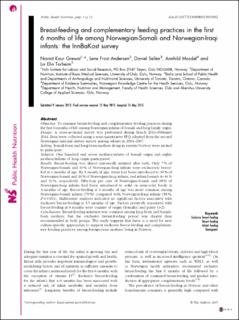| dc.contributor.author | Grewal, Navnit Kaur | |
| dc.contributor.author | Andersen, Lene Frost | |
| dc.contributor.author | Sellen, Daniel W | |
| dc.contributor.author | Mosdøl, Annhild | |
| dc.contributor.author | Torheim, Liv Elin | |
| dc.date.accessioned | 2021-09-10T08:46:51Z | |
| dc.date.available | 2021-09-10T08:46:51Z | |
| dc.date.created | 2015-09-30T21:54:54Z | |
| dc.date.issued | 2015 | |
| dc.identifier.citation | Public Health Nutrition. 2015, 19 (4), 703-715. | |
| dc.identifier.issn | 1368-9800 | |
| dc.identifier.uri | https://hdl.handle.net/11250/2775152 | |
| dc.description.abstract | OBJECTIVE: To examine breast-feeding and complementary feeding practices during the first 6 months of life among Norwegian infants of Somali and Iraqi family origin. DESIGN: A cross-sectional survey was performed during March 2013-February 2014. Data were collected using a semi-quantitative FFQ adapted from the second Norwegian national dietary survey among infants in 2006-2007. SETTING: Somali-born and Iraqi-born mothers living in eastern Norway were invited to participate. SUBJECTS: One hundred and seven mothers/infants of Somali origin and eighty mothers/infants of Iraqi origin participated. RESULTS: Breast-feeding was almost universally initiated after birth. Only 7 % of Norwegian-Somali and 10 % of Norwegian-Iraqi infants were exclusively breast-fed at 4 months of age. By 1 month of age, water had been introduced to 30 % of Norwegian-Somali and 26 % of Norwegian-Iraqi infants, and infant formula to 44 % and 34 %, respectively. Fifty-four per cent of Norwegian-Somali and 68 % of Norwegian-Iraqi infants had been introduced to solid or semi-solid foods at 4 months of age. Breast-feeding at 6 months of age was more common among Norwegian-Somali infants (79 %) compared with Norwegian-Iraqi infants (58 %; P=0·001). Multivariate analyses indicated no significant factors associated with exclusive breast-feeding at 3·5 months of age. Factors positively associated with breast-feeding at 6 months were country of origin (Somalia) and parity (>2). CONCLUSIONS: Breast-feeding initiation was common among Iraqi-born and Somali-born mothers, but the exclusive breast-feeding period was shorter than recommended in both groups. The study suggests that there is a need for new culture-specific approaches to support exclusive breast-feeding and complementary feeding practices among foreign-born mothers living in Norway. | |
| dc.language.iso | eng | |
| dc.title | Breast-feeding and complementary feeding practices in the first 6 months of life among Norwegian-Somali and Norwegian-Iraqi infants: the InnBaKost survey | |
| dc.type | Peer reviewed | |
| dc.type | Journal article | |
| dc.description.version | publishedVersion | |
| dc.description.version | publishedVersion | |
| dc.source.pagenumber | 703-715 | |
| dc.source.volume | 19 | |
| dc.source.journal | Public Health Nutrition | |
| dc.source.issue | 4 | |
| dc.identifier.doi | 10.1017/S1368980015001962 | |
| dc.identifier.cristin | 1277449 | |
| cristin.ispublished | true | |
| cristin.fulltext | original | |
| cristin.fulltext | original | |
| cristin.qualitycode | 1 | |

